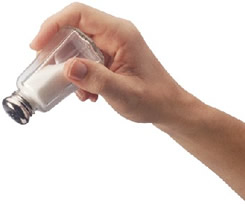Friday, March 31, 2006
Why Hypertonic Saline Treatments (should) Work

Some of the best discoveries happen quite by accident--telephones, silly putty and popsicles, just to name a few. The newest breakthrough in treatments for managing CF was also an incidental discovery. Someone noticed that people with CF who happened to be surfers exhibited fewer lung exacerbations than expected. This led to further investigation, and formal research of the benefits of salt water.
Although prevailing research for the use of hypertonic saline took place approximately 5 or more years ago, the use of hypertonic saline inhalation treatments for mucus clearance is the latest buzz in the CF world. My sincere appreciation goes out to those of you (and you know who you are) who were willing and able to participate in the clinical trials for this latest advance. In my opinion, every little bit helps when it comes to research, especially when the studies result in a worthwhile treatment option.
For those out there who may be starting on a regimen of nebulized hypertonic saline, or those who have been on it for awhile and can't seem to tell if it's making a difference or not, I'd like to explain in plain English the science behind the solution (pun intended).
First, let's get some background on those fancy scientific words.
Hypertonic saline solution: this means that the ratio of salt to water in the solution is greater than the ratio of salt to water in the cells of the body. The body prefers that its cells are in an isotonic state, meaning that the ratios of salt to water inside the cell are equal to the amounts in the rest of the body's cells.
In people with CF, our lungs are pretty dried out, which is related to the fact that we secrete so much salt when we sweat, and that salt pulls with it a lot of the water molecules we need. Without that water in our cells, it is very hard to effectively cough up the thick mucus we produce. There's so much gunk in there that needs to come out, but the body chemistry isn't right to make that happen easily. It's about as effective as trying to go the distance on a slip-n-slide before you turn on the water.
The amount of salt (concentration) in a hypertonic saline solution is different from the amount of salt in the cells lining our lungs. (This is why it is imperative that the proper concentration (i.e. 7%) be used in the nebulizer). This of course, makes things more moist in there, which is good. The increased moisture in the cells lining our lungs makes it much easier to cough productively.
Although the body is designed in such a way that the introduction of the high concentration of salt trigger's the cells to produce moisture to accomodate the chemical imbalance, many CF patients are on medications that interfere with this function of the body. Medications containing anti-histamines to deal with allergies and some antidepressants for example, rob the body of moisture and cause a state of dehydration. Also, diarrhea (not uncommon for CF patients with pancreatic insufficiency) can further deplete the body's water supply.
The greatest benefit from the hypertonic saline treatment is not so much in the chemical processes that occur in the body, but in the physical changes that result. The beneficial physical change that results is that the environment in the lungs is wetter.
On a personal note, I feel like I am doing well with the hypertonic saline treatments. They are making me cough more, which is slightly annoying, but I know that coughing is a good thing. The more gunk I'm able to cough up, the less there is remaining in there to harbor a nasty infection. Hypertonic saline treatment might not make you "feel" better per se, like a bronchodilater will when it opens up the airways. That's because the treatment is more like a chemical form of chest PT, and not like taking a round of antibiotics. Slow and steady wins the race with this one.
Don't expect to feel a dramatic difference after a saline treatment; instead, be diligent with your treatments knowing that it is preventive in nature and will likely reduce the number of infections that you'll get later on. Yes, it can be cumbersome and annoying to have even more treatments to add to the daily regime, but 20-30 minutes spent following your treatment plan have potentially significant payoffs when it comes to quality of life.
I hope this explanation has been helpful. As with anything regarding your own treatments, please check with your doctor if you need more information.
